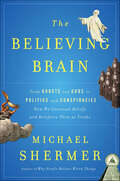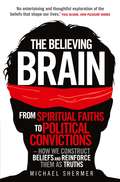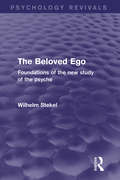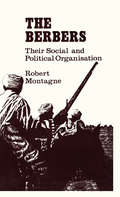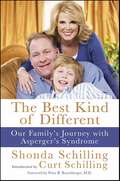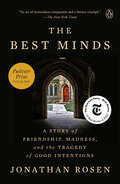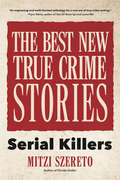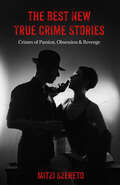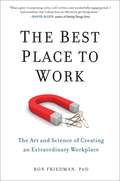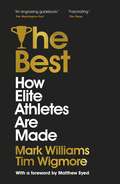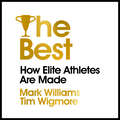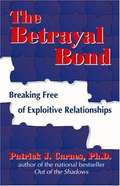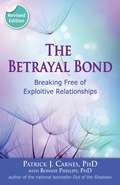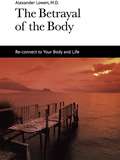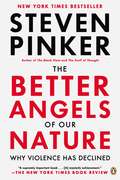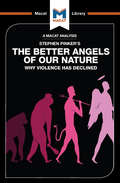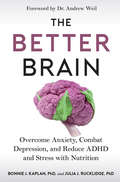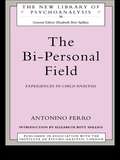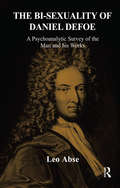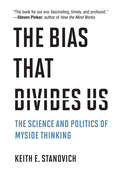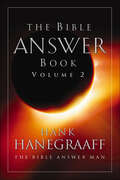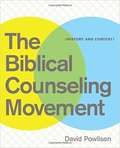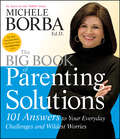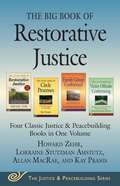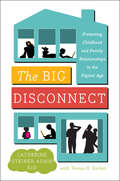- Table View
- List View
The Believing Brain: From Ghosts and Gods to Politics and Conspiracies—How We Construct Beliefs and Reinforce Them as Truths
by Michael Shermer“A wonderfully lucid, accessible, and wide-ranging account of the boundary between justified and unjustified belief.” —Sam Harris, New York Times–bestselling author of The Moral Landscape and The End of FaithIn this work synthesizing thirty years of research, psychologist, historian of science, and the world’s best-known skeptic Michael Shermer upends the traditional thinking about how humans form beliefs about the world. Simply put, beliefs come first and explanations for beliefs follow. The brain, Shermer argues, is a belief engine. From sensory data flowing in through the senses, the brain naturally begins to look for and find patterns, and then infuses those patterns with meaning. Our brains connect the dots of our world into meaningful patterns that explain why things happen, and these patterns become beliefs. Once beliefs are formed the brain begins to look for and find confirmatory evidence in support of those beliefs, which accelerates the process of reinforcing them, and round and round the process goes in a positive-feedback loop of belief confirmation. Shermer outlines the numerous cognitive tools our brains engage to reinforce our beliefs as truths.Interlaced with his theory of belief, Shermer provides countless real-world examples of how this process operates, from politics, economics, and religion to conspiracy theories, the supernatural, and the paranormal. Ultimately, he demonstrates why science is the best tool ever devised to determine whether or not a belief matches reality.“A must read for everyone who wonders why religious and political beliefs are so rigid and polarized—or why the other side is always wrong, but somehow doesn’t see it.” —Dr. Leonard Mlodinow, physicist and author of The Drunkard’s Walk and The Grand Design (with Stephen Hawking)
The Believing Brain: From Spiritual Faiths to Political Convictions – How We Construct Beliefs and Reinforce Them as Truths
by Michael ShermerSynthesizing thirty years of research, psychologist and science historian, Michael Shermer upends the traditional thinking about how humans form beliefs about the world. Simply put, beliefs come first and explanations for beliefs follow. The brain, Shermer argues, is a belief engine. Using sensory data that flow in through the senses, the brain naturally looks for and finds patterns - and then infuses those patterns with meaning, forming beliefs. Once beliefs are formed, our brains subconsciously seek out confirmatory evidence in support of those beliefs, which accelerates the process of reinforcing them, and round and round the process goes in a positive-feedback loop.In The Believing Brain, Shermer provides countless real-world examples of how this process operates, from politics, economics, and religion to conspiracy theories, the supernatural, and the paranormal. Ultimately, he demonstrates why science is the best tool ever devised to determine whether or not our belief matches reality.
The Beloved Ego: Foundations of the New Study of the Psyche (Psychology Revivals)
by Wilhelm StekelWilhelm Stekel was an Austrian physician and psychologist and one of Freud’s earliest followers. A prolific writer, this book originally published in 1921, was considered by the translator ‘the best general introduction of its author to the English public’, containing as is does many of his central ideas. Although the author had already fallen out with him by this time, in the preface to this book, he acknowledges Freud’s significance to the field and says he regards his ‘Psycho-Analysis as being a step towards a new psycho-therapy’.
The Berbers: Their Social and Political Organisation (Routledge Revivals Ser.)
by Robert MontagneFrance entered the North African world in 1830. Its overt political role there ended in 1962. The interpenetration of cultures and languages which resulted from the colonial conquest has not ended yet. No doubt a time will come when an intellectual balance sheet of this epoch comes to be drawn up. When this is done, Robert Montagne’s name will head the list of those Frenchmen who have made a study of Berber society. The brilliance of his ideas, the thoroughness and perceptiveness of his documentation, the range of his historical and comparative vision, and (a trait not always found in scholarly writing on North Africa) the simplicity and vigour of his style, all help to make plain that we have here a social thinker and observer of the very first rank, and one who deserves to be far better known outside the French-speaking world than he is at present.
The Best Kind of Different: Our Family's Journey with Asperger's Syndrome
by Shonda SchillingIn The Best Kind of Different, Shonda Schilling, the wife of Major League Baseball All Star, former Boston Red Sox, and World Series championship pitcher Curt Schilling, shares the story of their son’s Asperger’s Syndrome, how it changed their lives, and what other parents can learn about this increasingly common diagnosis. Candid and compelling, The Best Kind of Different traces their family’s struggle with Asperger’s, following Curt and Shonda as they come to understand their son’s differences and in the process relearn everything they thought they knew about parenting.
The Best Minds: A Story of Friendship, Madness, and the Tragedy of Good Intentions
by Jonathan Rosen&“Brave and nuanced…an act of tremendous compassion and a literary triumph.&” —The New York Times&“Immensely emotional and unforgettably haunting.&” —Wall Street JournalAcclaimed author Jonathan Rosen&’s haunting investigation of the forces that led his closest childhood friend, Michael Laudor, from the heights of brilliant promise to the forensic psychiatric hospital where he has lived since killing the woman he loved. A story about friendship, love, and the price of self-delusion, The Best Minds explores the ways in which we understand—and fail to understand—mental illness.When the Rosens moved to New Rochelle in 1973, Jonathan Rosen and Michael Laudor became inseparable. Both children of college professors, the boys were best friends and keen competitors, and, when they both got into Yale University, seemed set to join the American meritocratic elite.Michael blazed through college in three years, graduating summa cum laude and landing a top-flight consulting job. But all wasn&’t as it seemed. One day, Jonathan received the call: Michael had suffered a serious psychotic break and was in the locked ward of a psychiatric hospital.Diagnosed with paranoid schizophrenia, Michael was still in the hospital when he learned he'd been accepted to Yale Law School, and still battling delusions when he decided to trade his halfway house for the top law school in the country. He not only managed to graduate, but after his extraordinary story was featured in The New York Times, sold a memoir for a large sum. Ron Howard bought film rights, completing the dream for Michael and his tirelessly supportive girlfriend Carrie. But then Michael, in the grip of an unshakeable paranoid fantasy, stabbed Carrie to death with a kitchen knife and became a front-page story of an entirely different sort.The Best Minds is Jonathan Rosen's brilliant and heartbreaking account of an American tragedy. It is a story about the bonds of family, friendship, and community; the promise of intellectual achievement; and the lure of utopian solutions. Tender, funny, and harrowing by turns, at times almost unbearably sad, The Best Minds is an extreme version of a story that is tragically familiar to all too many. In the hands of a writer of Jonathan Rosen's gifts and dedication, its significance will echo widely.
The Best New True Crime Stories: Serial Killers (The\best New True Crime Stories Ser.)
by Mitzi SzeretoTravel around the world and inside the minds of monsters in this true crime anthology featuring sixteen astonishing serial killer exposés.Serial killers: Ted Bundy, John Wayne Gacy, and Jeffrey Dahmer are often the first names that spring to mind. Many people assume serial killers are primarily an American phenomenon that came about in the latter part of the twentieth century—but such assumptions are far from the truth. Serial killers have been around for a long time and can be found in every corner of the globe―and they&’re not just limited to the male gender, either. Some of these predators have been caught and brought to justice whereas others have never been found, let alone identified. Serial killers can be anywhere. And scarier still, they can be anyone. Edited by acclaimed author and anthologist Mitzi Szereto, The Best New True Crime Stories: Serial Killers reveals all-new accounts of true-crime serial killers from the contemporary to the historic. The international list of contributors includes award-winning crime writers, true-crime podcasters, journalists, and experts in the dark crimes field such as Martin Edwards, Lee Mellor, Danuta Kot, Craig Pittman, Richard O. Jones, Marcie Rendon, Mike Browne, and Vicki Hendricks. This book will leave you wondering if it&’s ever really possible to know who&’s behind the mask you&’re allowed to see.Perfect for readers of true crime books such as I&’ll Be Gone in the Dark, Mindhunter, The Devil in the White City, or Sons of Cain.&“An engrossing and multi-faceted anthology for a new era of true crime writing.&” ―Piper Weiss, author of You All Grow Up and Leave Me
The Best New True Crime Stories: Serial Killers (The\best New True Crime Stories Ser.)
by Mitzi SzeretoObsession, Unrequited Love, Jealousy, Revenge, and Violence Collide in this Page-Turning Anthology#1 New Release in Forensic Science Law and Hoaxes & DeceptionsCrimes of passion are both eerie and strangely tantalizing. How can someone you hold dear become someone you fear? This riveting anthology explores the question through some of the most compelling true crime accounts and stories of obsession and vengeance.Crimes fueled by emotions. Love, passion, obsession, jealousy, and betrayal. When it comes to the emotions, people can react in strange and unexpected ways. Whether it’s a heart hurt by unrequited love, or a lover so passionate they’ll stop at nothing to get their way—even the most mild-mannered soul can suddenly flip, becoming a vengeful spirit with dark intentions. From the ancient Greek myth of Jason and Medea to Shakespeare’s Othello, themes dealing with deeply felt emotions have persisted. But unlike mythology or fiction, The Best New True Crime Stories: Crimes of Passion, Obsession & Revenge contains stories from real life.A special selection of stories written exclusively for this book. The Best New True Crime Stories: Crimes of Passion, Obsession & Revenge includes stories from around the world and from different times. As with all titles in the popular The Best New True Crime Stories series, this volume contains original nonfiction accounts penned by writers from across the literary spectrum. Dive into these twisted true tales of passion and unrequited love turned violent. Examine why some have fully embraced their dark side, resorting to crime to achieve their own special brand of satisfaction and retribution.If you enjoyed Mitzi's last book in her series, The Best New True Crime Stories: Well-Mannered Crooks, Rogues & Criminals, and books like You Love Me, and The Big Book of Serial Killers Volume 2, then you’ll love The Best New True Crime Stories: Crimes of Passion, Obsession & Revenge.
The Best Place to Work: The Art and Science of Creating an Extraordinary Workplace
by Ron FriedmanFor readers of Malcolm Gladwell, Daniel Pink, and Freakonomics, comes a captivating and surprising journey through the science of workplace excellence. Why do successful companies reward failure? What can casinos teach us about building a happy workplace? How do you design an office that enhances both attention to detail and creativity? In The Best Place to Work, award-winning psychologist Ron Friedman, Ph.D. uses the latest research from the fields of motivation, creativity, behavioral economics, neuroscience, and management to reveal what really makes us successful at work. Combining powerful stories with cutting edge findings, Friedman shows leaders at every level how they can use scientifically-proven techniques to promote smarter thinking, greater innovation, and stronger performance. Among the many surprising insights, Friedman explains how learning to think like a hostage negotiator can help you diffuse a workplace argument, why placing a fish bowl near your desk can elevate your thinking, and how incorporating strategic distractions into your schedule can help you reach smarter decisions. Along the way, the book introduces the inventor who created the cubicle, the president who brought down the world's most dangerous criminal, and the teenager who single-handedly transformed professional tennis--vivid stories that offer unexpected revelations on achieving workplace excellence. Brimming with counterintuitive insights and actionable recommendations, The Best Place to Work offers employees and executives alike game-changing advice for working smarter and turning any organization--regardless of its size, budgets, or ambitions--into an extraordinary workplace.
The Best: How Elite Athletes Are Made
by A. Mark Williams Tim Wigmore"Insightful, thoughtful, and altogether wonderful." DANIEL COYLE, New York Times bestselling author of THE TALENT CODE"This book is a must read." EDDIE JONES, Head Coach, England Rugby"An engrossing guidebook for youth athletes, parents, coaches and perhaps even fantasy-league fans looking for a little insight." The Washington PostTHE SECRETS OF SUPERHUMAN PERFORMANCETHE BEST reveals how the most incredible sportspeople in the world get to the top and stay there. It is a unique look at the path to sporting greatness; a story of origins, serendipity, practice, genetics and the psychology of excellence, as well as of sports science and cutting edge technology.Packed with gripping personal stories and exclusive interviews with top athletes including Siya Kolisi, Marcus Rashford, Pete Sampras, Steph Curry, Jamie Carragher, Ian Poulter, Helen Glover, Ada Hegerberg, Elena Delle Donne, Joey Votto and Mike Hussey, it explains how the best athletes develop the extraordinary skills that allow them to perform remarkable feats under extreme pressure.Get inside the minds of champions and understand first-hand what makes them perform during high-octane competition, what they think about in the heat of the moment and what drives them to do what they do.By combining examples from numerous original interviews with top athletes and leading sports science research, THE BEST deconstructs superhuman performance and answers the question on every sports fan's mind: "How did they do that?""Fascinating and insightful... The Best isn't a one size fits all, it's a highly thought out, well-researched and accessible book that gives recommendations based on context and sport." JOANNE O'RIORDAN, The Irish TimesABOUT THE AUTHORSA. Mark Williams is an academic and one of the world's leading authorities on expertise and its acquisition in sport. He has published 18 books and written over 500 scientific articles on how people become skilled and achieve success in sport and across other professional domains. He has worked across the globe as a consultant with numerous Olympic and professional sports and has vast experience as a scientist, author and educator, and as an applied sports scientist.Tim Wigmore is the author of Cricket 2.0: Inside the T20 Revolution, the winner of the Wisden Book of the Year award for 2020. He is a sports writer for The Daily Telegraph, and has also written regularly for The New York Times, The Economist, the New Statesman and ESPNCricinfo. He is a former winner of the Young Cricket Journalist of the Year award and has been shortlisted for the Cricket Writer of the Year award.
The Best: How Elite Athletes Are Made
by A. Mark Williams Tim Wigmore"Insightful, thoughtful, and altogether wonderful." DANIEL COYLE, New York Times bestselling author of THE TALENT CODE"This book is a must read." EDDIE JONES, Head Coach, England RugbyTHE SECRETS OF SUPERHUMAN PERFORMANCEThe inside track on how champions are made, written by one of the world's top sports scientists and an award-winning sports journalist.Never have the best sportspeople seemed so far removed from the rest of us, their prowess so unfathomable. So how are these extraordinary athletes made?THE BEST reveals how the most incredible sportspeople in the world get to the top and stay there. It is a unique look at the path to sporting greatness; a story of origins, serendipity, practice, genetics and the psychology of excellence, as well as of sports science and cutting edge technology.Packed with gripping personal stories and exclusive interviews with top athletes including Siya Kolisi, Marcus Rashford, Pete Sampras, Steph Curry, Jamie Carragher, Ian Poulter, Helen Glover, Ada Hegerberg, Elena Delle Donne, Joey Votto and Mike Hussey, it explains how the best athletes develop the extraordinary skills that allow them to perform remarkable feats under extreme pressure.Get inside the minds of champions and understand first-hand what makes them perform during high-octane competition, what they think about in the heat of the moment and what drives them to do what they do.By combining examples from numerous original interviews with top athletes and leading sports science research, THE BEST deconstructs superhuman performance and answers the question on every sports fan's mind: "How did they do that?"(P) 2020 Hodder & Stoughton Limited
The Betrayal Bond
by Patrick J. CarnesExploitive relationships can create trauma bonds--chains that link a victim to someone who is dangerous to them. Divorce, employee relations, litigation of any type, incest and child abuse, family and marital systems, domestic violence, hostage negotiations, kidnapping, professional exploitation and religious abuse are all areas of trauma bonding. All these relationships share one thing: they are situations of incredible intensity or importance where there is an exploitation of trust or power. In The Betrayal Bond Patrick Carnes presents an in-depth study of these relationships, why they form, who is most susceptible, and how they become so powerful. He shows how to recognize when traumatic bonding has occurred and gives a checklist for examining relationships. He then provides steps to safely extricate from these relationships. This is a book you will turn to again and again for inspiration and insight, while professionals will find it an invaluable reference work.
The Betrayal Bond: Breaking Free of Exploitive Relationships
by Patrick CarnesSome really great books just keep getting better!For seventeen years The Betrayal Bond has been the primary source for therapists and patients wrestling the effects of emotional pain and harm caused by exploitation from someone they trusted. Divorce, litigation, incest and child abuse, domestic violence, kidnapping, professional exploitation and religious abuse are all areas of trauma bonding. These are situations and relationships of incredible intensity or importance lend themselves more easily to an exploitation of trust or power. In The Betrayal Bond, Dr. Carnes presents an in-depth study of these relationships; why they form, who is most susceptible, and how they become so powerful. Dr. Carnes also gives a clear explanation of the bond that compels people to tolerate the intolerable, and for the first time, maps out the brain connection that makes being with hurtful people comparable to 'a drug of choice.' Most importantly, Carnes provides practical steps to identify compulsive attachment patterns and ultimately to change or end them for good. This new edition includes: New science for understanding how our brains can make a prison of bad relationships New assessments and insights based on 50,000 research participants A new section utilizing the latest findings in attachment research and narrative therapy to concretely rewrite and rescript bad experiences A redefinition of the factors contributing to addictive relationships
The Betrayal of the Body
by Alexander LowenThe Betrayal of the Body is Alexander Lowen's pioneering study of the mind-body split.Lowen describes the way people deny the reality, needs, and feelings of their bodies. This denial leads to the development of the division between mind and body, creating an over-charged ego obsessed with thinking at the expense of feeling and being. This book illustrates the energetic factors behind the split, the factors that produce it, and the proven therapeutic techniques that are available to treat it. Lowen further explores the mind-body duality in the individual and its parallel duality and dysfunction in society between culture and nature, and between thinking and feeling.
The Better Angels of Our Nature: Why Violence Has Declined (Playaway Adult Nonfiction Ser.)
by Steven PinkerFaced with the ceaseless stream of news about war, crime, and terrorism, one could easily think we live in the most violent age ever seen. Yet as New York Times bestselling author Steven Pinker shows in this startling and engaging new work, just the opposite is true: violence has been diminishing for millennia and we may be living in the most peaceful time in our species's existence. For most of history, war, slavery, infanticide, child abuse, assassinations, pogroms, gruesome punishments, deadly quarrels, and genocide were ordinary features of life. But today, Pinker shows (with the help of more than a hundred graphs and maps) all these forms of violence have dwindled and are widely condemned. How has this happened?<P><P> This groundbreaking book continues Pinker's exploration of the essence of human nature, mixing psychology and history to provide a remarkable picture of an increasingly nonviolent world. The key, he explains, is to understand our intrinsic motives- the inner demons that incline us toward violence and the better angels that steer us away-and how changing circumstances have allowed our better angels to prevail. Exploding fatalist myths about humankind's inherent violence and the curse of modernity, this ambitious and provocative book is sure to be hotly debated in living rooms and the Pentagon alike, and will challenge and change the way we think about our society.<P> Chosen for Mark Zuckerberg's "A Year of Books" <P><b>A New York Times Bestseller</b>
The Better Angels of Our Nature: Why Violence has Declined
by Joulia SmortchkovaReasoning is the critical thinking skill concerned with the production of arguments: making them coherent, consistent, and well-supported; and responding to opposing positions where necessary. The Better Angels of Our Nature offers a step-by-step class in precisely these skills. Author Steven Pinker's central thesis is simple: mankind has become increasingly less violent over the centuries, and will continue to do so. Pinker is aware, though, that many people instinctively believe the opposite, and Better Angels is devoted to marshalling data to support and illustrate this central argument, as well as a series of secondary arguments about how and why humanity has become less violent. Pinker's interpretative skills – understanding the meaning of the complex evidence from history – are also on display throughout, as he tackles the ambiguities of his data, the problems it presents, and the viable inferences one can draw from it.
The Better Brain: Overcome Anxiety, Combat Depression, and Reduce ADHD and Stress with Nutrition
by Bonnie J. Kaplan Julia J. RucklidgeA paradigm-shifting approach to treating mental disorders like anxiety, depression, and ADHD with food and nutrients, based on the original, groundbreaking research of two leading scientists. We are in the midst of a mental health crisis. An estimated one in five American adults suffer from some form of mental illness. Despite the billions of dollars spent in pharmaceutical research and the rising popularity of antidepressant drugs, we are more depressed and anxious than ever before. What if we&’re looking for solutions in the wrong places? What if instead of treating mental illness with prescriptions and medication, we changed what we eat and how we feed our brains? Leading scientists Bonnie Kaplan, PhD and Julia Rucklidge, PhD have dedicated their lives to studying the role of nutrition in mental health. Together, they have published over 300 peer-reviewed scientific papers, many of which reveal the healing power of nutrients in the form of vitamins and minerals, and the surprising role they play in brain health. In this paradigm-shifting book, Kaplan and Rucklidge share their groundbreaking research, explaining how to feed your brain to stabilize your mood, stave off depression, and make yourself more resilient to daily stress. The Better Brain uncovers the hidden causes of the rising rates of depression and anxiety, from the decrease of nutrients in our soil to our over-reliance on processed food, and provides a comprehensive program for better brain health, featuring The ideal diet for your brain: a Mediterranean-style diet rich in fresh fruits, vegetables, nuts, and seeds.More than 30 delicious, mood-boosting recipes.Crucial advice on when to supplement and how.The Better Brain is your complete guide to a happier, healthier brain.
The Bi-Personal Field: Experiences in Child Analysis (The New Library of Psychoanalysis #Vol. 38)
by Antonino FerroIn The Bi-Personal Field Antonino Ferro sets out his new conceptual system for analysis, considering not only the inner world of the patient but the continued interaction of that world with the inner world of the analyst. The book takes a fresh look at the main aspects of theory and technique in psychoanalysis in the light of Kleinian developments. It reflects the drastic changes due to the thinking of Bion. Illustrated with numerous detailed clinical examples, the author claims that the basic focus of the analytic relationship is the conscious and unconscious interpersonal/ intersubjective processes going on between the analyst and patient.
The Bi-sexuality of Daniel Defoe: A Psychoanalytic Survey of the Man and His Works
by Leo AbseThis book presents an intriguing and novel Freudian overview of all Daniel Defoe's major works by confronting various psychoanalytic hypotheses regarding Defoe. It is an original, well-documented, and compelling cross-disciplinary approach to identity issues and creative genius of Defoe.
The Bias That Divides Us: The Science and Politics of Myside Thinking
by Keith E. StanovichWhy we don't live in a post-truth society but rather a myside society: what science tells us about the bias that poisons our politics.In The Bias That Divides Us, psychologist Keith Stanovich argues provocatively that we don't live in a post-truth society, as has been claimed, but rather a myside society. Our problem is not that we are unable to value and respect truth and facts, but that we are unable to agree on commonly accepted truth and facts. We believe that our side knows the truth. Post-truth? That describes the other side. The inevitable result is political polarization. Stanovich shows what science can tell us about myside bias: how common it is, how to avoid it, and what purposes it serves. Stanovich explains that although myside bias is ubiquitous, it is an outlier among cognitive biases. It is unpredictable. Intelligence does not inoculate against it, and myside bias in one domain is not a good indicator of bias shown in any other domain. Stanovich argues that because of its outlier status, myside bias creates a true blind spot among the cognitive elite--those who are high in intelligence, executive functioning, or other valued psychological dispositions. They may consider themselves unbiased and purely rational in their thinking, but in fact they are just as biased as everyone else. Stanovich investigates how this bias blind spot contributes to our current ideologically polarized politics, connecting it to another recent trend: the decline of trust in university research as a disinterested arbiter.
The Bible Answer Book: Volume 2 (The Bible Answer Book)
by Hank HanegraaffThe Bible Answer Book Volume 1 covered 81 of the top questions that Hank Hangegraaff, the Bible Answer Man, has answered in his ministry. Now he's coming back in Volume II with more questions and answers. Selected from among the thousands of topics he's addressed over the years, topics include family, faith, fear, sin, salvation, and many more issues vital to better understanding God. Each question is approached in Hanegraaff's scholarly, concise, yet easy-to-understand style, and he even suggests additional sources for readers who want to explore the topics further.
The Biblical Counseling Movement: History And Context
by David Arthur PowlisonBeginning in the late 1960s, a biblical counseling movement sought to reclaim counseling for the church and provide a Christian alternative to mainstream psychiatry and psychotherapy. The Biblical Counseling Movement: History and Context is an informative and thought-provoking account of that movement. This historical account combines careful scholarship with a unique, eyewitness insight. This book is an invaluable resource for those who want to understand the biblical counseling movement. The core chapters were originally a Ph.D. dissertation in history of science and medicine (University of Pennsylvania). This new edition adds a lengthy appendix, containing articles by Dr. Powlison that give an analysis of developments within the biblical counseling movement and in its relationship to evangelical psychotherapists.
The Big Book of Parenting Solutions: 101 Answers to Your Everyday Challenges and Wildest Worries (Child Development #1)
by Michele BorbaThe Today show expert &“tackles 101 issues ranging from sibling rivalry, lying and peer pressure to cell-phone use and TV addiction . . . Indispensable&” (Publishers Weekly). A recommended read for moms by Working Mother magazine. In this down-to-earth guide, parenting expert Michele Borba offers advice for dealing with children&’s difficult behavior and hot button issues including biting, temper tantrums, cheating, bad friends, inappropriate clothing, sex, drugs, peer pressure, and much more. Written for parents of kids age 3-13, this book offers easy-to-implement advice for the most important challenges parents face with kids from toddlers to tweens. Includes immediate solutions to the most common childhood problems and challenges Written by Today&’s resident parenting expert Michele Borba Offers clear step-by-step guidance for solving difficult childhood behaviors and family conflicts Contains a wealth of advice that is easy-to-follow and gets quick results Author has written outstanding parenting books including Building Moral Intelligence, No More Misbehavin&’, Don&’t Give Me that Attitude, and more Each of the 101 issues includes clear questions, specific step-by-step solutions, and advice that is age appropriate. &“Moms and dads have come to rely on Dr. Borba for advice on issues large and small. The Big Book of Parenting Solutions is an indispensable, comprehensive, and authoritative guide to the wonderful and sometimes wacky world of parenthood. You&’ll find yourself dipping into it for answers again and again.&” —Dana Points, Editor-in-Chief, Parents Magazine &“The easy-to-use problem/solution format will have you battling your biggest parenting crises with confidence.&” —Working Mother
The Big Book of Restorative Justice: Four Classic Justice & Peacebuilding Books in One Volume (Justice and Peacebuilding)
by Howard Zehr Kay Pranis Allan Macrae Lorraine AmstutzFor the first time, the four most popular restorative justice books in the Justice & Peacebuilding series—The Little Book of Restorative Justice: Revised and Updated, The Little Book of Victim Offender Conferencing, The Little Book of Family Group Conferences, and The Little Book of Circle Processes—are available in one affordable volume. Restorative justice, with its emphasis on identifying the justice needs of everyone involved in a crime, is a worldwide movement of growing influence that is helping victims and communities heal while holding criminals accountable for their actions. This is not a soft-on-crime, feel-good philosophy, but rather a concrete effort to bring justice and healing to everyone involved in a crime. Circle processes draw from the Native American tradition of gathering in a circle to solve problems as a community. Peacemaking circles are used in neighborhoods, in schools, in the workplace, and in social services to support victims of all kinds, resolve behavior problems, and create positive climates. Each book is written by a scholar at the forefront of these movements, making this important reading for classrooms, community leaders, and anyone involved with conflict resolution.
The Big Disconnect
by Teresa H. Barker Edd Catherine Steiner-AdairHave iPads replaced conversation at the dinner table? What do infants observe when their parents are on their smartphones? Should you be your childs Facebook friend?As the focus of family has turned to the glow of the screen--children constantly texting their friends, parents working online around the clock--everyday life is undergoing a massive transformation. Easy availability to the Internet and social media has erased the boundaries that protect children from the unsavory aspects of adult life. Parents often feel they are losing a meaningful connection with their children. Children are feeling lonely and alienated. The digital world is here to stay, but what are families losing with technologys gain?As renowned clinical psychologist Catherine Steiner-Adair explains, families are in crisis around this issue, and even more so than they realize. Not only do chronic tech distractions have deep and lasting effects, but children desperately need parents to provide what tech cannot: close, significant interactions with the adults in their lives. Drawing on real-life stories from her clinical work with children and parents, and her consulting work with educators and experts across the country, Steiner-Adair offers insights and advice that can help parents achieve greater under-standing, authority, and confidence as they come up against the tech revolution unfolding in their living rooms. We all know that deep connection with the people we love means everything to us. Its time to look with fresh eyes and an open mind at the disconnection we are experiencing from our extreme device dependence. Its never too late to put down the iPad and come to the dinner table.
